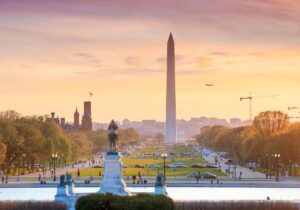More than a month after the killing of George Floyd triggered peaceful protests as well as violent riots, scattered mobs continue to deface and tear down symbols of America’s past. Just as a distinction should be made between the peaceful protestors and the violent mobs, a distinction should be made between symbols of the United States and those of the Confederate States—and between the United States and its enemies.
Not only did the Confederacy make war against the United States—by the time Abraham Lincoln took office, seven states preemptively seceded from the United States; within a month of his inauguration, Confederate forces bombarded the US base at Fort Sumter—but the cause for which the Confederacy fought was and is repugnant. The debate over states’ rights may have been a factor, but it was slavery that lit the powder keg. And it was slavery that motivated the leaders of the Confederacy. But don’t take my word for it.
The Confederacy’s president, in his own words, defended “the rights of the owners of slaves,” criticized those “engaged in exciting amongst the slaves a spirit of discontent,” and boasted about what enslaved people achieved “under the supervision of a superior race.”
The Confederacy’s vice president pointed out—accurately—that the United States “rested upon the assumption of the equality of the races,” while his government was “founded upon exactly the opposite ideas: its foundations are laid, its cornerstone rests, upon the great truth that the negro is not equal to the white man; that slavery is his natural… condition. This, our new government, is the first, in the history of the world, based on this…truth.” Shockingly, statues of the Confederate president and vice president stand in the US Capitol.
Confederate General Henry Benning “was such an enthusiast for slavery that as early as 1849 he argued for the dissolution of the Union and the formation of a Southern slavocracy,” Gen. David Petraeus writes.
Thus, the Senate Armed Services Committee recently approved a measure ordering Confederate names removed from Defense Department facilities (like Fort Benning in Georgia), and there’s a bill working its way through Congress that orders the removal of statues inside the Capitol of Confederate figures. The state of North Carolina announced plans to remove Confederate monuments from the state capitol grounds. The state of Mississippi retired its state flag with a Confederate emblem. Navy leaders are ordering the Confederate flag removed “from all public spaces and work areas aboard Navy installations, ships, aircraft and submarines.”
All of this is long overdue. At war’s end, the symbols of the Confederacy should have been consigned to history books—not accorded places of honor.
Congressional leaders remind us that how we do something is important. These symbols, nameplates, and statues honoring the Confederacy should be removed in an orderly fashion, at the direction of and with the permission of relevant federal, state, and local government agencies—not by rampaging mobs.
Why we do something is equally important. Motives matter, as scripture teaches. The motivation for removing Confederate symbols and honorific names is to correct a mistake of history, not to revise or blot out history. And here we underscore the distinction between peaceful protestors and violent mobs. We know and appreciate the motives of the peaceful protestors—to shine a light on police misconduct and pursue justice. But what exactly are the motives of the mobs that for more than a month have defaced statues of George Washington, Thomas Jefferson, Abraham Lincoln, and Ulysses S. Grant plus memorials honoring America’s war dead? Their motives are surely not to build a more perfect union. Instead, these mobs seek to destroy rather than build—subscribing to the unattainable purity of Maximilien Robespierre or, equally apt, the Taliban.
Before balking at such a comparison, consider the toppling of Grant’s statue. Do the mobs know that Grant liberated hundreds of thousands from slavery and vanquished a racialist regime? During surrender parleys, such as at Vicksburg, Confederate commanders proposed terms that included the right of Confederate troops to retain their “property.” Grant, knowing that was code for enslaved human beings, rejected such terms.
Or consider the defacing of war memorials. Do the mobs know what these memorials represent?
In 1917–18, 116,000 Americans died defending democracy from authoritarian regimes. In 1941–45, 405,399 Americans—of all races—died liberating Europe and Asia from racialist-eugenicist empires. From 1948 to 1991, America sacrificed 100,000 lives and $6 trillion protecting the frontiers of freedom from Soviet totalitarianism—the freedom to speak or remain silent, to peacefully assemble, to worship any god or no god at all, to define and pursue happiness. (Doubtless, the mobs will retort that America was or is no better than the Soviet Union. But then the mobs must explain why Moscow had to build walls to keep people in—and why Moscow’s former subjects are today America’s allies.) In the years since the Soviet empire’s collapse, America has served as civilization’s first-responder and last line of defense—saving Liberians from Ebola, Yazidis from ISIS, Somalis from famine; rescuing millions of Africans from AIDS, Indonesians from tsunamis, Haitians from anarchy; protecting Kuwaitis, Kurds, Kosovars, and Koreans from violent neighbors; liberating Afghans, Iraqis, and Libyans from terrorist tyrannies; prying open classrooms to Afghan girls; guarding Serbian Christian kids and Albanian Muslim kids on the way to school; defending the Baltics and rebuilding the Balkans; and pouring more into global COVID-19 relief than any other country (12 times as much as China). This is the work of a great and good nation.
Sadly, the mobs rampaging through America understand less about this country than those who’ve never lived here. It’s telling that even as Americans torch the American flag and deface symbols of American sacrifice, the people of Hong Kong are waving the American flag and singing the “Star-Spangled Banner.” Similar scenes can be glimpsed in Poland, Georgia, Libya, Kosovo, Taiwan, Colombia, Iraqi Kurdistan, and Tanzania. The list goes on. Related, the musical Hamilton has taken Britain by storm, will tour Asia in 2021, heads to France in 2022, and is being translated into German.
Why is this? Why would Europeans and Asians want to see a musical that celebrates America’s founding? Why are they waving American flags in Hong Kong and Dar es Salaam, Warsaw and Pristina, Erbil and Tbilisi? Why aren’t they waving Russian or Chinese flags, or flocking to musicals about Mao or Lenin?
The answer is that America, while imperfect, is a force for good in the world—and always has been.
As they assault statues of America’s founding fathers, the mobs are unable or unwilling to make a distinction between something rotten and wrong at its core (like the Confederate States) and something imperfect but good at its core (like the United States).
The entire founding project—with all its contortions and compromises—was a step toward a freer, more just nation and world. But, again, don’t take my word for it.
Rather than calling for statues of Jefferson to be torn down, Martin Luther King Jr. called Jefferson’s Declaration of Independence “majestic,” specifically citing the most famous words in the American lexicon: “We hold these truths to be self-evident, that all men are created equal, that they are endowed by God, Creator, with certain inalienable rights, that among these are life, liberty and the pursuit of happiness.”
“This is a dream,” King cheered, “a great dream.”
Unlike the mobs, King was able to look beyond the flaws and failures of the founders—and see what they envisioned, what they hoped for, what they dreamed. King saw that Jefferson’s masterpiece reflects “an amazing universalism.” The Declaration of Independence, King explained, “doesn’t say ‘some men,’ it says ‘all men.’ It doesn’t say ‘all white men,’ it says ‘all men,’ which includes black men. It does not say ‘all Gentiles,’ it says ‘all men,’ which includes Jews. It doesn’t say ‘all Protestants,’ it says ‘all men,’ which includes Catholics. It doesn’t even say ‘all theists and believers,’ it says ‘all men,’ which includes humanists and agnostics.”
King understood that this document, this dream, makes America exceptional. “That dream goes on to say another thing that ultimately distinguishes our nation and our form of government from any totalitarian system in the world. It says that each of us has certain basic rights that are neither derived from or conferred by the state… They are God-given, gifts from His hands. Never before in the history of the world has a sociopolitical document expressed in such profound, eloquent, and unequivocal language the dignity and the worth of human personality.”
Like Lincoln, King believed that “God somehow called America to do a special job for mankind and the world.” And unlike the mob, King had the wisdom to recognize that even though America is imperfect, “the founding fathers of our nation dreamed this dream in all of its magnificence” and “professed the great principles of democracy.” They may not have practiced those principles to the full—they may not have known how to practice them—but they were the first to profess them so clearly and plainly. As King understood, that was an enormous step for humanity. “We have a great dream. It started way back in 1776, and God grant that America will be true to her dream.”
King recognized that for nations, as for individuals, the measure of goodness is not perfection, but rather direction. America was born headed in the right direction—and continues to build a “more perfect union” dreamed up by imperfect men.







 Sponsor a student for Christianity & National Security 2024
Sponsor a student for Christianity & National Security 2024